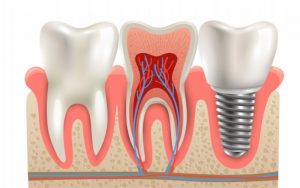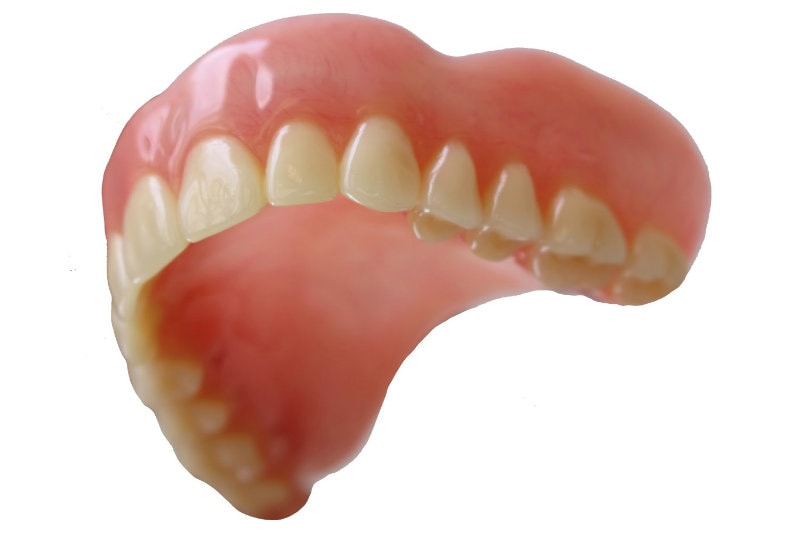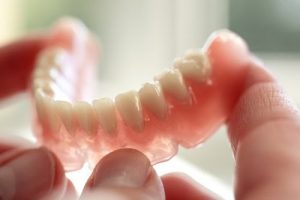
Wearing dentures for the first time, or getting used to new dentures (for individuals currently on dentures) can be a bane for most. Below are some useful pointers on getting used to dentures and how to ease into this transition with minimal discomfort.
Make sure your dentures are well-fitted

Individuals who have been on dentures for years may experience pain with their current dentures, as the gums and supporting bone structures change over time. Make sure that you only put on well-fitted dentures. Otherwise, these problems may occur:
- Problems eating and speaking
- Dentures that slide around in your mouth
- Gum and mouth irritation (that could eventually lead to mouth infections)
Such discomfort might discourage you from putting on your dentures at all, often leading to frustration, loss of confidence, unhealthy eating habits, weight loss, and other problems.
Never attempt to adjust your dentures on your own. Should you have problems with your dentures, see your dentist immediately. Dentists can adjust and refit your dentures to be as comfortable as possible.
Gum Pain and Discomfort While Getting Used to Your Dentures

It is normal to experience gum pain and discomfort in the first two weeks of wearing new dentures. Give yourself some time to adjust to them. Below are some methods you can try to help relieve the pain, and live more comfortably:
-
Topical Gel or Cream
Apply a topical gel or cream that is specifically made to relieve oral pain and sore areas of your gum. Ask your dentist for the gel or cream. Alternatively, you may purchase them from your neighbourhood pharmacy.
-
Denture Adhesives
Loose and slipping dentures are a major cause of sores on the gums. Try using a denture adhesive to keep your dentures in place.
-
Denture Adjustment
Your dentist may suggest the incorporation of a soft liner under your denture. This acts as a cushion between your dentures and gums, alleviating some of the pain and discomfort.
Should the discomfort and pain persist after two weeks, schedule an appointment with your dentist for the readjustment of your dentures. However, should you begin to see sores on your gums or tongue, make an appointment to see your dentist immediately.
Difficulty Eating With Dentures
Eating with dentures can be challenging and will require some practice. When you bite down or chew, your dentures may slip out of position. Pain could be experienced while you’re getting used to your new pair of dentures. Avoid eating foods with hard and sharp bits like popcorn, potato chips, and nuts as these foods may get stuck under your dentures, causing you pain.
You may also experience difficulty chewing apart certain foods like fibrous fruits and vegetables, and nuts and seeds, but it is no reason to eliminate these highly nutritious foods from your diet.
Start with soft foods that are easier to bite. For tough-to-chew foods like meats, slice them into smaller portions. Also, try eating vegetables that have been cut into small pieces. Then practice chewing your food with sides of your mouth together, not directly on your front teeth. You may also consider blending your vegetables and fruits into a smoothie for a refreshing and nutritious treat!
A small amount of denture adhesive may help to hold your dentures in place while you eat.
Speaking with Dentures Could Feel Different

Speaking can be difficult with new dentures too. You may feel like your dentures are interfering with your speech.
When you’ve gotten your new set of dentures, try speaking or reading aloud to yourself in private until you feel comfortable. Learning how to move your tongue around your dentures to form the correct sounds can be challenging, but in time, speaking with dentures will become second nature.
Denture Slippage

Occasionally when you smile, laugh or cough, you may notice that your dentures will slip out of position. As mentioned earlier, the same may sometimes happen while eating or talking. If your new dentures slip out of place, gently reposition them by biting down and swallowing.
Over time, you’ll learn to hold your dentures in place with the muscles in your cheeks and tongue. If you find that you are not getting used to your denture and slippage continues, consider seeing your dentist again as your dentures may need adjustment for a better fit.
Getting used to your new pair of dentures will take some time. Alternatively, you may consider other prosthetic options such as dental implants to skip the pain and inconvenience of using traditional dentures.
Dental Implants – A Better Alternative

Unlike traditional dentures that can be removed, dental implants are not removable and are a more permanent alternative for replacing missing teeth.
The prosthetic teeth are supported by surgically positioned dental implants that mimic the support and function of a natural tooth. They do not move around during use. This would also mean that you will be able to chew and enjoy your food, speak clearly, and clean your teeth like you’re used to. The bite strength of teeth supported by implants is also several times higher than that of a denture.
Reasons Why Dental Implants Are Preferred to Dentures
For a long time, dentures have been a solution for replacing missing (or whole set) teeth. However, as described above, there are several inconveniences associated with denture use. Although one may still chew with dentures, no matter how well it has been made, the bite force is much weaker than natural teeth.
Below are more reasons why dentures are least preferred:
-
Dentures dull the senses in your mouth

The upper denture typically has a false palate that covers the roof of the mouth. This inhibits your sense of taste and blocks your perception of heat and cold while you are eating or drinking.
-
Dentures cause accelerated bone loss in your jaws

The jawbone supporting your teeth needs the pressure that comes from normal biting and chewing to maintain its volume and density.
Traditional dentures do not provide the pressure needed to maintain the bone volume in your jaw. Thus, denture wearers develop wrinkles around their mouths, overly thin lips, pointed chins, and tend to look prematurely aged.
As the jawbone underneath a denture continues to shrink, it becomes progressively more difficult to make any denture fit well at all.
-
Dentures continuously lose their fit over time

Due to the continuous loss in bone mass and the change of your jawline, dentures lose their fit with time and will need constant adjustments and periodic remakes. Loose dentures slip often and are the main cause of discomfort and sores on the gum.
Conclusion
Are you looking to trade your natural teeth for dentures, or experiencing discomfort and looking to replace your current set?
With dental implants, the solution to chew properly again does not come with the inconvenience of traditional dentures. Furthermore, you’ll be able to utilize MediSave funds to supplement dental implant treatment fees!
Still considering between dentures and dental implants? At T32 Dental, our dentists will assess your condition and provide you with a comprehensive understanding of denture solutions. Schedule an appointment with us today!
